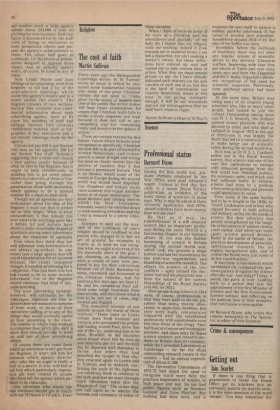Religion
The cost of faith
Martin Sullivan
Thirty years ago the distinguished Cambridge divine, H. H. Farmer, wrote an essay in which he examined some fundamental reasons why many of the great Christian verities did not seem to "come alive,"in the minds of modern men. One of the points this writer makes will bear closer examination. He argues that Christian truth fails to evoke a lively response, not least because it does not call in any compelling way for "something costly and decisive in the sphere of action."
There are certain reasons for this failure. Values which hitherto were recognised as specifically Christian are now felt to be part of normative human behaviour, and consequently a sense of right anclAvrong has been so closely woven into the pattern of conduct that it has become a permanent feature. This is an illusion which some of the events in Europe during the second world war should have dispelled. Gas chambers and torture racks came suddenly into vogue. Another factor is of equal importance. The great decisive and costing choices which the New Testament demands, seem to be whittled down to undemanding trivialities and the Cross is reduced to a pretty ornament.
Attempts to spell out the measure of the costliness of one's religion should be confined to the person who engages in it, but we are all grateful for examples to inspire us. At least we can recognise what we ought to do even if we fall abysmally short of the goal. I am choosing, as an illustration, what a couple of men were prepared to pay for their convictions because one of them, Barnabas by name, canonised and honoured in the Christian calendar, had his festival a few days ago, on June 11. He and his companion Paul suffered some rough treatment from time to time, and they knew what it was to be run out of cities, imprisoned and flogged.
This restrained account of one episode reveals the worth of these warriors: "There came to Lystra certain Jews from Iconium and Antioch, who persuaded the people, and having stoned Paul, drew him out of the city, supposing him to be dead. Howbeit as the disciples stood round about him he rose up and came into the city and the next day he departed with Barnabas to Derbe. And when they had preached the Gospel to that city, they returned again to Lystra and to Iconium and to Antioch, confirming the souls of the righteous and exhorting them to continue in the faith and that we must through much tribulation enter into the Kingdom of God." The writer does not call upon us to admire the heroism and constancy of either of these disciples.
When I think of the even tenor of my ways as a Christian and the smoothness and placidity of. my daily life I realise that my religion costs me nothing; indeed it even rewards me in material terms. I am not a masochist, nor am I seeking a martyr's crown, but these reflections have entered my soul and caused me to take certain lines of action. What they are must remain private to me. As I have already indicated such matters are the sole concern of each one of us, but this is the kind of contribution our country desperately needs at this hour. In our giving, strangely enough, it will be our economies and not our extravagances that we shall have cause to regret.
Martin Sullivan is Dean of St Paul's


































 Previous page
Previous page